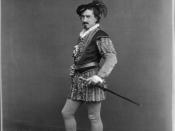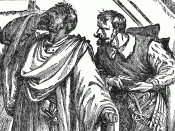"Tragedy and the Common Man" written by Arthur Miller defines what he feels is a tragedy. There are several different characteristics that Miller feels defines a tragic figure. One is that the main character does whatever he has to do to secure his personal sense of dignity. Another key part of a tragedy is the "tragic flaw" that the main character has. When the character recognizes his tragic flaw, he tries to overcome it, and fails in the process. Willy Loman and Othello definitely fit the description of a tragic figure.
Willy Loman's major flaw was his pride or dignity. He couldn't accept the fact he was getting old and he was losing the respect of people. He tries to hard to be well respected and liked. We know this is true because what he says to his sons when he dreams of the past, "That's why I thank Almighty God you're both built like Adonises.
Because the man who makes an appearance din the business world, the man who cares personal interested is the man who gets ahead. Be liked and you will never want. You take me, for instance. I never have to wait in line to see a buyer." Miller (1314) Willy was getting too old for his job; he was having trouble doing it. His friend Charley offered him a job he could handle but his pride and dignity told him that he wasn't too old for his current job. He ends up losing his job. Now he can't even support his family. He even loses the respect of his sons, when Happy tells the two girls he was with, that Willy wasn't his father. He couldn't overcome his flaw of not accepting himself, and in the end he kills himself to escape the repercussions...
![From the Library of Congress: TITLE: Thos. W. Keene. Othello CALL NUMBER: POS - TH - 1884 .O7, no. 1 (C size) [P&P] REPRODUCTION NUMBER: LC-USZC6-58 (color film copy transparency) RIGHTS INFORMATION: No known restrictions on publication. MEDIUM: 1 print (](https://s.writework.com/uploads/9/94760/library-congress-title-thos-w-keene-othello-call-number-pos-thumb.jpg)

